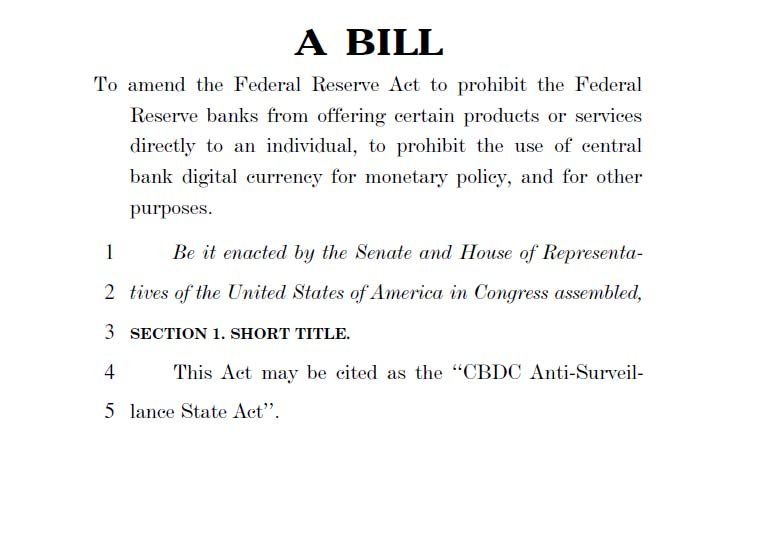In a move to safeguard financial privacy and prevent government surveillance, a bipartisan group of United States senators have introduced a legislation aimed at halting the issuance of Central Bank Digital Currencies (CBDCs). The proposed bill, CBDC Anti Surveillance State Act, challenges the authority of the Federal Reserve to implement CBDCs, expressing concerns over potential infringements on individuals’ freedom and privacy.
CBDCs have been a topic of discussion in the recent years, with proponents touting their potential efficiency and convenience. However, critics argue that CBDCs could pose significant risks to privacy and freedom, allowing for extensive government surveillance and control over financial transactions.
CBDC Anti Surveillance State Act
On February 26, Senator Cruz and his colleagues introduced the CBDC Anti-Surveillance State Act, which seeks to block the Federal Reserve from issuing CBDCs. The proposed legislation aims to restrict the Federal Reserve’s authority to offer CBDCs directly to individuals or through financial institutions, as well as prevent their use for monetary policy purposes.

Led by Senator Ted Cruz, along with Senators Rick Scott, Bill Hagerty, Ted Budd, and Mike Braun, the bipartisan group voiced strong opposition to the Biden administration’s plans for a digital dollar. They argue that CBDCs could be used to monitor citizens’ spending habits and infringe on personal liberties.
Senator Ted Cruz stated:
“The Biden administration salivates at the thought of infringing on our freedom and intruding on the privacy of citizens to surveil their personal spending habits, which is why Congress must clarify that the Federal Reserve has no authority to implement a CBDC. I’m proud to lead the fight in the Senate to restrict the Federal Reserve’s exploration of and attempt to introduce a CBDC to the American economy.”
The Senators’ Concerns
Senator Ted Budd believes CBDCs will enable government to control spending habits of people, highlighting:
“As Americans face the prospect of an increasingly weaponized government, ensuring financial privacy is pivotal. A CBDC would open the door for the federal government to surveil and control the spending habits of all Americans. Any push to establish a CBDC must be confronted and stopped, and that’s why I’m proud to join Senator Cruz’s effort to do just that.”
Senator Bill Hagerty underlines reports of political and religious profilings by FinCEN, stating:
“From Operation Chokepoint to recent reports of political and religious profiling by FinCEN, it is clear that government bureaucrats have been far too willing to exploit the financial system to advance political agendas and target Americans. This bill blocks the issuance of a central bank digital currency, preventing CBDC from being used as a tool to surveil and violate Americans’ privacy.”
Senator Rick Scott emphasized that the proposed bill aims to ensure that Americans’ financial data remains private and secure. He highlighted the importance of protecting financial privacy, stating:
“Big government has no business spying on Americans to control their personal finances and track their transactions. It is a massive overreach and a non-starter for me. That is why I am proud to join Senator Ted Cruz to introduce the CBDC Anti-Surveillance State Act to stand up against this invasive practice and keep Big Brother out of your bank account.”
Cruz’s legislation filing depicts CBDC as “government-controlled programmable money” capable of gathering personal data and controlling funds arbitrarily.
Support from Industry and Associations
The legislative efforts have garnered support from various industry associations, including Heritage Action for America, the Blockchain Association, the American Bankers Association (ABA), the Independent Community Bankers Association (ICBA), and the Club for Growth. These organizations echo concerns about the potential surveillance and control implications of CBDCs.
Heritage Action for America opposes the idea, emphasizing the need to protect Americans’ financial privacy from potential surveillance and control associated with a government-run digital currency. They support the Anti-Surveillance State Act introduced by Senator Cruz, encouraging congressional action on the issue. It stated:
“While Americans across the country are being punished for thinking, speaking, and voting the ‘wrong’ way, the last thing we need is the government surveilling personal finances. A Central Bank Digital Currency (CBDC) is a fixed-value, government-run cryptocurrency that replaces the dollars in your bank and wallet.”
The Blockchain Association also highlights privacy concerns, warning that CBDCs could allow the government to collect intimate personal details and potentially track and freeze funds for any reason. They applaud the introduction of the CBDC Anti-Surveillance State Act as a measure to prevent the issuance of a CBDC in the United States, adding:
“We applaud the introduction of the CBDC Anti-Surveillance State Act in the Senate – legislation aimed at preventing a CBDC from being issued in the United States.”
The American Bankers Association (ABA) and the Independent Community Bankers of America (ICBA) share reservations about CBDCs, expressing concerns about the risks to the financial system, credit availability, and consumer privacy. ABA’s President and CEO Rob Nichols commends Senator Cruz and cosponsors for introducing the legislation to protect consumers and the financial system. ICBA President & CEO Rebeca Romero Rainey strongly opposes a U.S. CBDC, emphasizing that it would disintermediate community banks, reduce credit availability, and undermine consumer privacy.
David McIntosh, President of Club for Growth, argues that a U.S. CBDC would threaten the country’s financial health and constitutional rights. He contends that it could subject Americans to financial surveillance and discrimination based on their beliefs, hamper economic growth by displacing private sector investment, and create financial volatility by encouraging capital withdrawal from private banks. Club for Growth supports Senator Cruz’s legislation as a crucial measure to safeguard Americans from the potential dangers of a CBDC.
Broader Opposition
Former President Donald Trump has also voiced opposition to CBDCs, pledging to “never allow” their formation if re-elected. Trump’s stance aligns with concerns raised by other critics about the potential negative impact of CBDCs on individual freedoms and financial privacy.
Conclusion
The introduction of legislation to block CBDCs reflects growing concerns among policymakers and industry stakeholders about the potential risks of government-controlled programmable money. As the debate over CBDCs continues, the focus remains on protecting individuals’ freedom and financial privacy in an increasingly digital world.
Overall, the bipartisan efforts to restrict the implementation of CBDCs signal a broader commitment to safeguarding personal liberties and privacy rights in the digital age.










